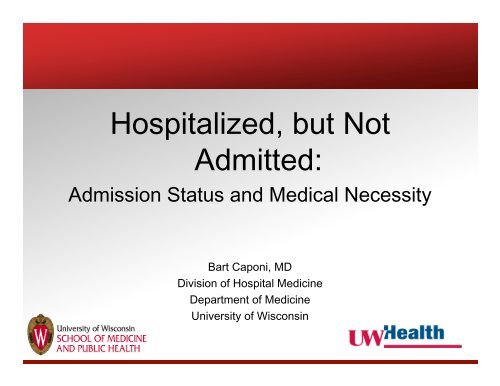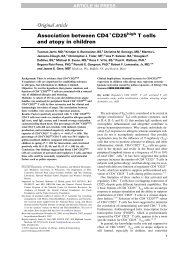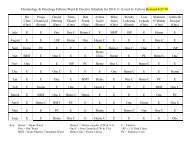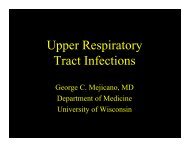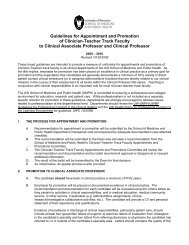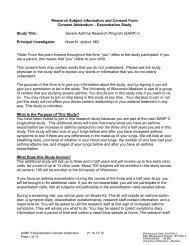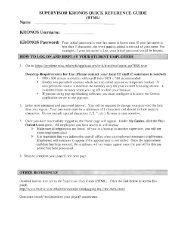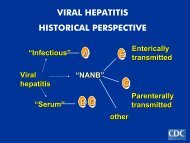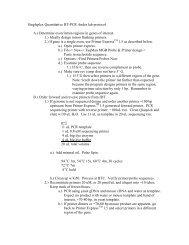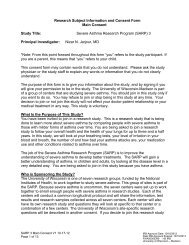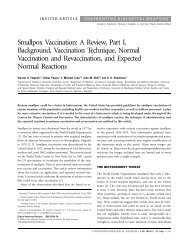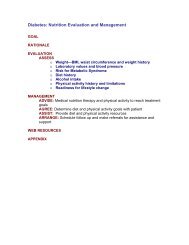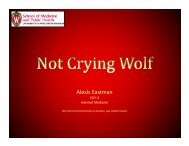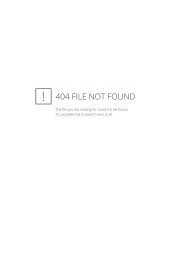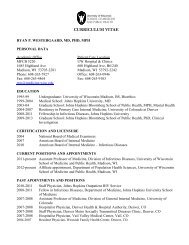Hospitalized, but Not Admitted: Admission Status
Hospitalized, but Not Admitted: Admission Status
Hospitalized, but Not Admitted: Admission Status
Create successful ePaper yourself
Turn your PDF publications into a flip-book with our unique Google optimized e-Paper software.
<strong>Hospitalized</strong>, <strong>but</strong> <strong>Not</strong><br />
<strong>Admitted</strong>:<br />
<strong>Admission</strong> <strong>Status</strong> and Medical Necessity<br />
Bart Caponi, MD<br />
Division of Hospital Medicine<br />
Department of Medicine<br />
University of Wisconsin
Disclaimers<br />
• I have no disclosures to report<br />
• Medicare calls the tune, and all others<br />
follow<br />
• Any number of agencies reviewing<br />
things…
What do these people have in<br />
common<br />
• An 85yo man found in a hoarder-type situation, with mild<br />
confusion<br />
• A 73yo woman with COPD, new SOB, and diffuse<br />
wheezes, satting 91% on room air<br />
• A 79yo man with a low-trauma pubic ramus fracture to<br />
be managed non-operatively<br />
• None of them meet inpatient criteria!
Why This is Important…<br />
• Patients strongly affected by all of this<br />
– Access to benefits<br />
– Disposition options<br />
– Disposition pressures<br />
– Changes in billing<br />
• Financial issues are large and permanent<br />
• Clinical and financial bottom lines matter<br />
– Institutions need to be healthy to help patients!<br />
• This is a general medical problem!<br />
– ~25% of all FM/GMED patients are OBS; 25% stay >48hrs<br />
– Costs hospital $33/hr per patient
Objectives<br />
• Introduction and Definitions:<br />
– Inpatient<br />
– Observation (OBS)<br />
– Interqual<br />
• Recovery Audit Contractors (RAC) and Medical<br />
Necessity (MN)<br />
• How to Navigate Observation <strong>Status</strong> in 2012
Inpatient versus Observation<br />
and Interqual
Medicare 101<br />
• Medicare for Inpatients:<br />
– Part A pays for inpatient services with one annual<br />
deductible ($1156 in 2012), further “coinsurance”<br />
– Part B pays for “doctor services”, some meds, DME,<br />
with an annual deductible and an episodic 20% copay<br />
– SNF benefit after 3 day prequalifying stay<br />
• Medicare for Outpatients:<br />
– No Part A benefit<br />
– Part B pays as above<br />
– No SNF benefit
Medicare 102<br />
• Diagnosis-related group (DRG) is how we get paid<br />
• Established in early 1980s, to reward systems caring for<br />
sicker, more complex patients<br />
• Diagnosis and comorbidities considered<br />
• Facility gets a lump sum for all care based on the DRG<br />
• DRG determined by diagnosis, documentation<br />
• <strong>Not</strong>e: Medicare sets the course, everyone else follows
Inpatient versus Observation<br />
• Observation status created in early 1980s as a<br />
temporizing, money-saving measure<br />
• Definition: “a well-defined set of specific…appropriate<br />
services…include ongoing short term treatment,<br />
assessment, and reassessment…furnished while a<br />
decision is being made…”<br />
• Timing: “In the majority of cases…decision…to<br />
discharge…or to admit…can be made in less than 48<br />
hours…in only rare and exceptional cases do reasonable<br />
and necessary outpatient observation services span<br />
more than 48 hours.”
Inpatient versus Observation<br />
• Intended for patients who probably need monitoring<br />
rather than a full admission<br />
– Initially only CP, CHF, asthma; extended to any<br />
diagnosis in 2008<br />
– Includes OSS patients<br />
• <strong>Not</strong>hing to do with physical location--OBS is outpatient!<br />
• Criteria somewhat arbitrary and don’t necessarily fit best<br />
medical practice<br />
• At UWHC, 67.5% of OBS stay over 24hrs; 26.4% over<br />
48hrs
Inpatient versus Observation: InterQual<br />
• “The Gold Standard in Evidence-Based Clinical Decision<br />
Support”<br />
• Used by CMS, 3700 Hospitals, 300 Health Plans, the<br />
military, others<br />
• Originated due to demands created by birth of Medicare<br />
and Medicaid; these programs led to guidelines, which<br />
were very subjective and not evenly applied<br />
• InterQual is a checklist…<br />
• Physician judgment can trump guidelines if the judgment<br />
portion/documentation is clear
Inpatient versus Observation:<br />
Checklist<br />
• UGIB: observation if:<br />
– Has melena or positive gastric lavage<br />
– HGB >8.3, PLT >60K, gets PPI, EGD confirms<br />
– No blood/fluids administered<br />
• UGIB: inpatient if:<br />
– Has hematemesis, melena, or positive lavage and…<br />
– Either HGB
Inpatient versus Observation: Practical<br />
Points<br />
• In practical use, some conditions are almost always<br />
“observation”<br />
• Examples: syncope, any pain, failure to thrive, “rule outs”,<br />
outpatient surgeries, etc<br />
• Reviewers are paying particularly close attention to:<br />
– These diagnoses/mismatches<br />
– Extremes of LOS, short or long<br />
– <strong>Status</strong> changes
Inpatient versus Observation: Practical<br />
Points<br />
• Days do matter, and a proper status needs to be in place<br />
as soon as possible<br />
• We can’t bill for services until the proper status order is<br />
written<br />
• Changes patient’s bill and benefits dramatically<br />
• Early management of patient expectations<br />
• This all plays into the bottom line, financially and in terms<br />
of clinical ratings<br />
• The “23-hour rule” is irrelevant
Recovery Audit Contractors (RAC) and<br />
Medical Necessity
On the RAC<br />
• A limited Medicare audit intended to prevent fraud for<br />
inappropriate inpatient billings was performed from 2005-<br />
08<br />
• Identified $1.03 billion in improper payments<br />
• 96% were overpayments recollected from providers<br />
• Audits permanent in 2006, nationwide in 2010<br />
• “Recovery Audit Contractors”—private companies paid<br />
on contingency<br />
• 10/2009-9/2012: $3.16 billion in overpayments collected
RAC Audits<br />
• UW Policy: all charts reviewed at admission for<br />
appropriate status (utilization review or UR)<br />
• RAC gets ~400 closed charts every ~45 days; we prescreen<br />
submissions<br />
• Submitted charts are reviewed/possibly denied by RAC<br />
• Some charts reviewed for coding (correct DRG), some<br />
for medical necessity of services provided (MN)<br />
• Vast majority of our denials are for MN<br />
• Denials can be appealed; multiple levels with strict<br />
deadlines<br />
• No reimbursement collected on final denials
Medical Necessity<br />
• Medicare pays for “reasonable and necessary”<br />
interventions, which they define…<br />
– Meets standard of care, is clinically appropriate, and<br />
not for benefit or convenience of payer, patient,<br />
provider<br />
– Does not have to pay for interventions deemed<br />
neither reasonable nor necessary<br />
– Establishes policies that determine payment status<br />
– Reviews individual cases after the fact
Medical Necessity<br />
• A test may be appropriate, <strong>but</strong> not “necessary”<br />
• MN relates more to setting of service than to need for<br />
service<br />
• Common denial reasons:<br />
– Lack of supporting documentation<br />
– Pre-existing conditions<br />
– Lack of preauthorization<br />
– Interventions deemed experimental
Medical Necessity<br />
• Example: transplant workup in a stable person with<br />
cirrhosis admitted for chest pain evaluation<br />
• Example: diagnostic guaiac in a GI bleed coded as<br />
“colon CA screening”<br />
• Example: any lab “fishing expeditions”<br />
• Outpatient clinics are liable to MN denials too; focus is<br />
on inpatient as largest fraction/easy target
How to Navigate Observation<br />
<strong>Status</strong>
Document, document, document!<br />
• Make your rationale clear to auditors<br />
• Document what you have tried, what you’re worried<br />
about, what’s going on<br />
• Appropriate diagnoses and documentation significantly<br />
effect the patient’s and the hospital’s clinical and<br />
financial bottom lines (CMI, SOI, mortality)<br />
• Never embellish, exaggerate, or document something<br />
you didn’t do!
Medicare Benefit Policy Manual, 1:10<br />
• “The decision to admit a patient is a complex medical<br />
judgment which can only be made after the physician<br />
has considered a number of factors…admissions…are<br />
not covered or noncovered solely on the basis of the<br />
length of time the patient actually spends in the hospital.
Examples<br />
• If you don’t explicitly state something, it can’t be inferred<br />
• Document things like:<br />
– Short-term risk of death<br />
– Complexity of decision-making<br />
– Patient’s comorbidities<br />
– Tolerances for specific fluid rates, med doses, etc<br />
– Why this can’t be done in an ideal clinic setting<br />
• Auditors are looking at H&P, DC summary—so make<br />
these documents comprehensive!
Examples<br />
• S: Knee pain O: Knee pain A: Knee pain P: Knee<br />
replacement: denied!<br />
• Patient established care for knee pain due to OA 18<br />
months ago. At that time, a trial of NSAIDS and APAP for<br />
6 months produced no benefit. Three intraarticular<br />
steroid injections produced no relief, nor did six months<br />
of physical therapy. Thus, arthroplasty is indicated.<br />
• “Admit to OBS for rule out MI”: a nightmare!<br />
• While the ECG and biomarkers are normal, her risk<br />
factors of smoking and diabetes suggest a high risk of<br />
cardiac chest pain. I am concerned about the short-term<br />
risk of death from ACS. Thus, further urgent evaluation<br />
is warranted.
Examples<br />
• Identify all the diseases patient has on arrival…NOT<br />
“chronic issues, per home management”<br />
• Don’t say “rule out”, “non-cardiac”, “ACS” as diagnoses<br />
• Attri<strong>but</strong>e when you can!<br />
• SIRS + (suspected/likely) infection = sepsis<br />
• Urosepsis = UTI, so DO NOT say urosepsis<br />
• Avoid abbreviations AMAP<br />
• It is OK to be wrong as long as you’re reasonable!
Same patient, different documentation<br />
• 75yom with CHF presents with pneumonia: MS-DRG<br />
195, simple pneumonia without CC/MCC; $3757<br />
• 75yom with CHF presents with aspiration PNA: MS-DRG<br />
179, complex PNA w/o CC/MCC; $6173<br />
• 75yom with aspiration PNA, secondary systolic HF: MS-<br />
DRG 178, complex PNA with CC; $9241<br />
• 75yom with aspiration PNA, acute on chronic systolic<br />
heart failure: MS-DRG 177, complex PNA with MCC;<br />
$13,359
So, what now<br />
• I always “err” on patient’s side…<br />
• Observation status here to stay…for now<br />
• OIG looking at abuse of OBS status<br />
• If you aren’t sure, it is probably observation<br />
• Document all the details!<br />
• Will complexity arguments hold up TBD<br />
• The rules (or at least interpretation and enforcement) will<br />
change again…<br />
• Lawsuits about OBS, change in 3-day stay rules,<br />
Congress starting to hear more about it
References<br />
• www.medicare.gov<br />
• InterQual criteria<br />
• www.mckesson.com<br />
• Wikipedia<br />
• Edelberg, C. Getting Paid for ED Services: Keys to Documenting Medical Necessity.<br />
PowerPoint presentation, Progressive Healthcare Conferences, Jan 6, 2010.<br />
• Mitus, J. The Birth of InterQual: Evidence-Based Decision Support Criteria That<br />
Helped Change Healthcare. Professional Case Management. Vol. 13, No. 4, 228–<br />
233.<br />
• Genensway, D. How observation care is complicating life for you and your patients.<br />
Today’s Hospitalist. Feb 2012, 26-30.<br />
• http://www.medicare.gov/publications/pubs/pdf/11435.pdf<br />
• http://www.aha.org/advocacy-issues/rac/index.shtml<br />
• 9 th World Congress—Physician Advisor; various presentations<br />
• Feng et al. Health Affairs 2012


